4th OPVStability Training Workshop and Project Meeting, Oct 13–17, 2025
Hennickehammars Herrgård, Filipstad, Sweden
The 4th OPVStability Training Workshop and Project Meeting was successfully held at Hennickehammars Herrgård in Filipstad, Sweden, hosted by Karlstad University. The event brought together doctoral candidates, supervisors, and partners for an engaging week of learning, collaboration, and project development.
The training programme included interactive courses on Understanding Impact, UCD Impact Planning Canvas, NABC Model in Pitching, and the Value Creation Forum: Structured Feedback, led by James Lees and Eamonn McCallion from the KAU Grants and Innovation Office.
In addition to the training sessions, a Supervisory Board Meeting was held to review project updates, followed by doctoral candidates’ project presentations and Q&A sessions.
Participants also enjoyed the beautiful autumn weather, taking the opportunity to go rowing on the lake and enjoy the serene surroundings of Filipstad.

Researchers Night - 26th September 2025
The European Researchers' Night was celebrated across Europe: an event that, for years, has brought institutes, universities, and research centres to the public square to share their work with citizens, showcase cutting-edge research, and highlight what the European Union is doing to support research in its Member States. OPVStability took to the streets in Austria, Italy, and Spain.
The OPVStability project participated in the European Researchers' Night across multiple locations. In Italy, the team extended its presence through the Trieste Next festival (September 26-28), presenting the work of its ten PhD researchers and the potential of organic photovoltaics.
In Austria, the TUGraz team—Virginia Lafranconi, Project Coordinator Gregor Trimmer, and colleagues—set up an interactive booth dedicated to the solar cells of the future. In Spain, Manan Mehta from ICMAB spoke to about fifty students from the Lycée Français about the role organic photovoltaics could play in urban environments. In Italy, CERIC-ERIC researcher Devina Gupta and Elisa Baioni (Lead of the project's communication team) engaged audiences, young and old, through a quiz about the project.
Reaching the public, sharing the work of the researchers involved, and highlighting the support received from the European Union are key goals of the project, which is why it actively encourages its PhD students to participate in science outreach activities.
The energy behind the outreach
The feedback from attendees confirmed the project's impact. People who participated in the quizzes and talks dedicated to OPVStability showed genuine enthusiasm, demonstrating how much energy—and particularly its sustainable production—matters to European citizens of all ages and backgrounds.
"I'm thrilled by the number of questions the high school students asked after the talk, and the attention they were paying to me. I feel happy that I could share the role of clean energy for our world, and how organic photovoltaics play a part in it," said an enthusiastic Manan. But he wasn't the only one pleased with the event. "I am positively surprised by how many people stopped spontaneously, not just to glance at the graphics and the quiz we created, but also to listen to what we're doing and ask questions about the practical implementation of OPVs," Devina told Dr. Andrew Harrison, Executive Director of CERIC-ERIC, who visited her at the stand.
The work on organic solar cell stability, aimed at maintaining their efficiency over time, is one of the key steps that would enable large-scale adoption of this type of photovoltaics. The information disseminated by the DCs provided the public with a preview of the technologies that could potentially power cities and homes in the future. In return, the researchers gained valuable feedback on what people consider important in interacting with such new devices. Events such as the European Researchers' Night are valuable occasions for these types of exchanges.
“I was really happy to see so many children interested in science, even in its more complex aspects. It’s important to nurture this curiosity — they will be the next generation of scientists!” said Virginia.
The project has now reached its two-year mark and is halfway through its journey. Here's to a hundred more nights like this!
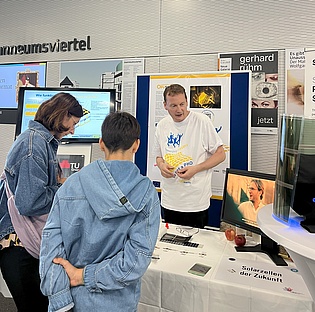
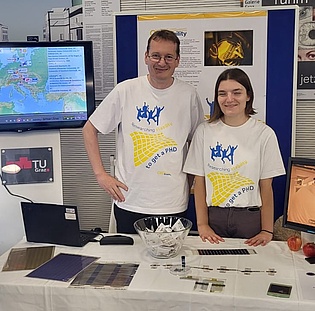
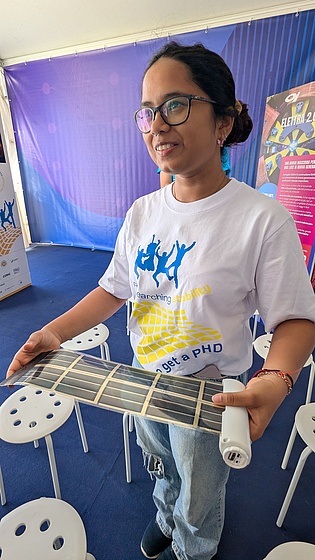
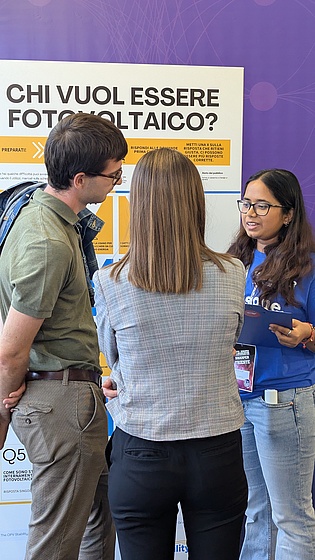
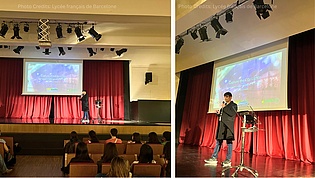
OPVStability Project Meeting – 5th to 8th May 2025, Linz, Austria
The OPVStability consortium met from May 5th to 8th, 2025, at Johannes Kepler University Linz for a four-day event combining training, presentations, and strategic discussions.
The program began on Monday with a training session on Intellectual Property Rights and Patents, led by Markus Scharber. On Tuesday and Wednesday, the project meeting featured doctoral candidate presentations, DC-supervisor sessions, and working group discussions focused on secondments and work package coordination. The team also enjoyed a group dinner at Schlossbrasserie and a visit to the Ars Electronica Center.
The meeting concluded on Thursday with a training on Gender and Diversity, delivered by Dr. Waltraud Ernst.
The event provided valuable opportunities for knowledge sharing, planning future steps, and strengthening collaboration across the consortium.
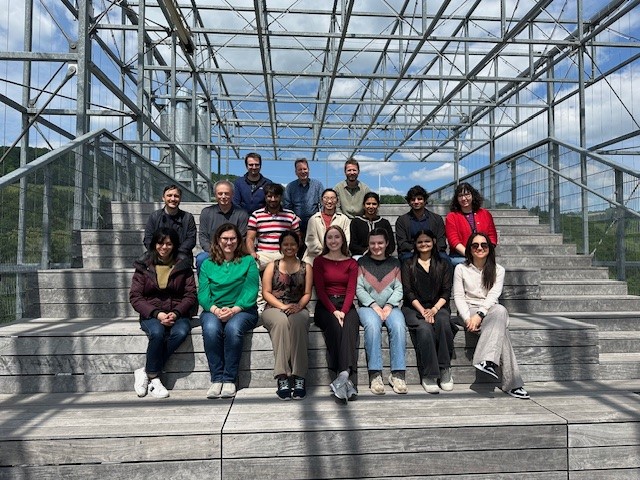
Kicking Off the OPV Stability Project
The OPV Stability Project's kick-off meeting took place in Erlangen, Germany, from April 8th to 11th. Partners, supervisors, and PhD students convened to deliberate on the Project's forthcoming steps and commence the initial training sessions.
Organic solar cells represent a promising avenue for the production of emission-free electricity: compared to silicon cells, they are lighter, thinner, and possess enhanced flexibility, all while maintaining good power conversion efficiency. Nonetheless, the swiftness of their degradation remains a formidable impediment to widespread adoption. Hence, the key question is: how can we prolong the lifespan of organic photovoltaics? Ten PhD students will undertake this challenge over the next four years of the Project.
A training program and individualized career guidance have been instituted to delve deeper into the evolution of these technologies and pinpoint stable motifs, materials, and architectures. The gathering in Erlangen marked the initial stride in this important journey.
The meeting started with presentations from participating universities, industrial entities, and research facilities, fostering an interdisciplinary milieu that encouraged students to contemplate science while acknowledging the potential economic ramifications of their research endeavours. Subsequently, PhD candidates engaged in one-on-one discussions with supervisors to delineate their work agendas and commence training sessions.
The first one was a comprehensive "Introduction into OPV," laying a robust foundational understanding of the technology. This was seamlessly followed by an extensive overview of photovoltaics and its pivotal role in transforming energy systems.The Meeting highlights included lab visits of i-Meet and Hi-Ern, providing firsthand exposure to cutting-edge equipment utilized in OPV research. Furthermore, participants had the privilege to explore OPV production during a visit to Energie Campus Nurnberg, gaining valuable insights into practical applications.
A workshop focusing on "Big Data, statistics, data mining, and machine learning" further equipped the DCs with analytical tools indispensable for effective data interpretation, thus augmenting their capabilities in OPV research and development. In sum, these activities facilitated a comprehensive and enriching learning experience, nurturing collaboration and fostering innovation among all participants.
The OPV Stability Project presents a novel comprehensive strategy that includes high-throughput experiments and artificial intelligence methods to set the path for the next generation of OPVs. As the project coordinator, Gregor Trimmel, from the Institute for Chemistry and Technology of Materials at TU Graz, remarked: “High efficiency, low costs and long lifetimes are essential qualities for every solar cell technology. OPVs have already shown that they can compete in the first two factors, as their efficiencies are approaching 20% with a very low cost of production. However, OPVs still lag in stability. Within OPVStability, we focus on this very key issue, and I am confident that we will make a significant contribution to the further advancement of this technology.”
Partners of the project are Technical University Graz, Johannes Kepler University Linz, Consejo Superior de Investigaciones Científicas, Ben-Gurion University of the Negev, Paul Drude Institute - Forschungsverbund Berlin e.V., Karlstad University, Central European Research Infrastructure Consortium, University of Bayreuth, Friedrich Alexander Universität Erlangen - Nürnberg, University of Southern Denmark as well as the associated partners InfinityPV, ASCA GmbH, Universitat Autonoma de Barcelona, Sunbooster GmbH, Zentrum für Elektronenmikroskopie, and University of Potsdam.
TU Graz in Austria – Training (for DCs) – April 13-14 and 17, 2026
Supervisory and Board Meetings (for PIs and DCs) - April 15-16, 2026
Paul-Drude-Institute in Berlin, Germany - Training (for DCs) – October 7-9, 2026
Supervisory and Board Meetings (for PIs and DCs) - October 7-8, 2026

